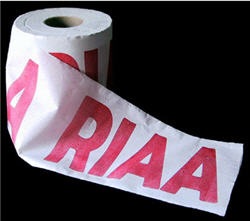RIAA and MPAA vs BitTorrent. 1: 0 in favor of p2p networks
- Transfer

For many years, the American Sound Recording and Cinema Association has hired specialists to attack key nodes of BitTorrent networks, thereby trying to make it difficult for the end user to receive content. Based on recently published studies by scientists at New York University, such attacks are extremely ineffective. At best, they slow down the download by a few minutes, and sometimes they go completely unnoticed. Recording studios and film studios are ready to pay big money to protect their property from distribution in file-sharing networks. They spent millions of dollars on anti-piracy defense systems, such as MediaDefender, whose representatives, in turn, promised to do everything to distribute fake and damaged downloads.
According to the recently published authorship report by Priitula Dungel, Di Wab and Kate Ross, these countermeasures are nothing more than a waste of time and money. In the document Measuring and Reducing the Number of Attacks on the BitTorrent Network, researchers show that BitTorrent hosts are hardly affected by anti-piracy protection systems.
Researchers examined the effectiveness of two attack methods that are used by companies, in particular MediaDefender. The first method is the so-called "fragment attack". In this case, the attacker tries to slow down the download from users by means of constant hash errors (some parts of the downloaded file are transmitted with a previously created error, which ultimately makes the downloaded file useless). The second type of attack is “connection-error”, when the attacker tries to “bind” the maximum number of TCP connections to his computer (while on his computer there are only structurally similar files that have nothing to do with the necessary users), as a result of which it becomes impossible get real data.
These types of attacks were tried while downloading a popular music album. The key nodes of this distribution in the BitTorrent network were attacked by the above methods. “We present the results for the new album’s torrent file that were obtained during the attack on it,” the researchers said, adding “This popular album was released a few weeks before our experiment. At the time of our research, he was
# 1 on the UK chart and iTunes rating. ”The attacked torrent file was downloaded several times using the torrent clients Azureus (Vuze) and uTorrent. For each download, the download completion time was recorded with the on and off program blocking unwanted “attacking” IP addresses.
The results were quite interesting. Researchers found that on average, downloads with the unwanted IP blocking program turned on were 30-35% faster. In other words, anti-piracy measures really slow down the download process, but in most cases only by a few minutes, which is clearly not enough to stop the download process as a whole.
A closer look at the principle of distribution of uploaded files in the two above BitTorrent clients makes it clear that without IP filters, uTorrent receives only 2% of erroneous data packets that use the “fragment attack” method. Azureus, in turn, did not receive a single erroneous packet at all with this type of attack inside, while it received 18% of erroneous TCP connections (connection-error).
Not surprisingly, the researchers concluded that the methods used to attack BitTorrent nodes are extremely inefficient. “Anti-piracy companies are not very successful in combating the spread of protected property through the BitTorrent network. We also came to the conclusion that filtering IP addresses by the blacklist is not able to limit all attacks, ”the researchers note. It has been observed that both Azureus and uTorrent include algorithms to combat these types of attacks. Of course, the results may vary when compared with other p2p clients. The developers of Azureus (now Vuze) have done a lot of work to prevent “fragmented attacks”, while uTorrent has built-in similar tools to combat corruption of file contents.
The conclusion from the entire study seems to be one, and for most readers it is not even surprising. Millions of dollars spent by the entertainment industry to protect the results of their activities from being distributed in peer-to-peer networks at best is only a little difficulty for the “pirates”.
Translation : LMW
